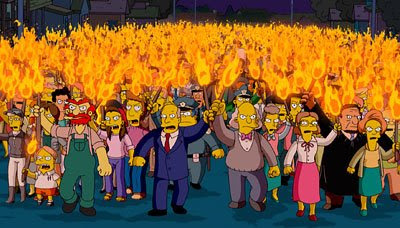In a democracy, it's never the people's fault
 The moral indignation against the News of the World reached new heights last week. There's a moment when politics suddenly goes limbic - suddenly everyone is 'disgusted', 'revolted', 'sickened' and so on. The political debate becomes highly emotional, unreasoned. People queue up to voice their disgust, like Romans at a vomitorium.
The moral indignation against the News of the World reached new heights last week. There's a moment when politics suddenly goes limbic - suddenly everyone is 'disgusted', 'revolted', 'sickened' and so on. The political debate becomes highly emotional, unreasoned. People queue up to voice their disgust, like Romans at a vomitorium.
Not that the News of the World doesn't deserve opprobrium for their antics over the last 30 years - their salacious probing into celebrities' private lives, their hysterical fear-mongering on law and order. But there's a reason that the paper is the best-selling newspaper in the country - people buy it. Several million people buy The Sun and the News of the World, because those papers give their audiences what they want.
And yet, in all the denunciations of Rupert Murdoch and Rebekah Brooks, or Andy Coulson, or David Cameron, we haven't heard one word against the people who really caused this to happen - us. Murdoch's power over British society doesn't magically arise from some genie in a lamp. It arises because so many people buy his newspapers and watch his television stations. We give him his power. Yet no one would ever blame the British public for its taste in media.
This is the infantilism of democracy. It's never the people's fault. We blame some shadowy elite - the banks, the MPs, the media barons - while we, poor victims that we are, never understood what was going on. We must always be protected. Someone else must always take the rap. Then we whip ourselves into a self-gratifying frenzy of moral indignation, tear some individual or institution down, and feel better about ourselves. But we never examine or challenge our own tastes, appetites and desires. And that's really what has power in a democracy - our own appetites. As long as our appetite for trivial celebrity gossip and simplistic moral indignation remains unabated, then there will be another Rupert Murdoch along shortly to feed it.
The great media revolution that Rupert Murdoch helped create was the idea that the people's appetites were sacrosanct. The BBC was set up in 1922 to 'educate, inform and entertain'. But Murdoch attacked the first two of this holy trinity, insisting that any attempt to guide or educate the people's tastes was elitist paternalism. It's not the job of the media to inform or educate the public. Simply give them what they want. If they want celebrity gossip and mob-style moral crusades, then give them it. Murdoch was, you have to say, a robust democrat. He believed absolutely in the legitimacy of the popular will. If the people want an obnoxious right-wing TV network, give them Fox News.
We may succeed in bringing down News International, but no one has even suggested that Murdoch's model of the media is wrong, and that the people's tastes and appetites might need educating, refining and shaping. To suggest that would still be political suicide. It would still be considered rank elitist paternalism. The only media outlet that portrays the popular will in all its infantilism is probably The Simpsons, which is owned by, yes, Rupert Murdoch.
